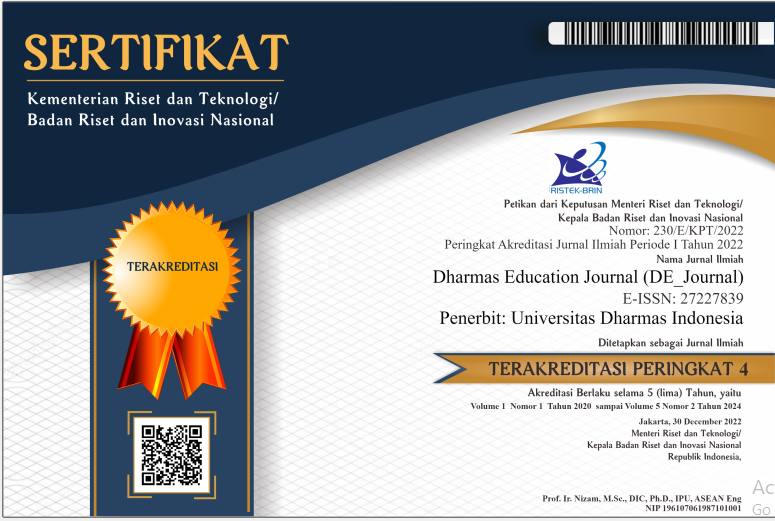Relevansi Isu Mutakhir Kesenjangan Sosial Pada Pembelajaran Bahasa Dan Sastra Indonesia
DOI:
https://doi.org/10.56667/de_journal.v6i2.1940Keywords:
Social Inequality, Language Learning, Literature LearningAbstract
The learning of Indonesian language and literature is closely related to the reality of human life. Not only good teaching and correct language skills, language and literature are also able to reflect social conditions such as educational gaps, culture, and other societal problems. Based on this, the purpose of writing this article is to describe the relevance of the latest issue of social disparity in education to the learning of Indonesian language and literature. The method used in this study is a literature study by collecting information and news related to education gaps, especially in terms of facilities and access to learning, in the period from 1 to 30 May 2025. The data was then analysed and associated with the implementation of Indonesian language and literature learning. The findings show that the issue of social disparities in education, such as differences in facilities between schools, and unequal access to technology, has relevance in Indonesian language learning. This happens because these social realities can be used as material for reflection, teaching materials, and learning evaluation. The conclusion of this article emphasizes that the learning of Indonesian language and literature cannot be separated from the dynamics of people's lives, so the issue of social disparities in education is important to be raised in a contextual and meaningful learning process.
Downloads
References
Albaburrahim, A. (2021). Pendidikan Karakter Siswa Melalui Pembelajaran Bahasa Indonesia di Pasca Pandemi pada Madrasah Aliyah An-Najah I Karduluk, Sumenep. GHANCARAN: Jurnal Pendidikan Bahasa Dan Sastra Indonesia, 130–141. https://doi.org/10.19105/ghancaran.vi.5425
Amanullah, W. A., & Wantini, W. (2024). Analisis Kesenjangan Sosial di Sekolah: Perspektif Sosiologi Pendidikan Islam (Studi Kasus di SDN Bhayangkara Yogyakarta). Jurnal Dirosah Islamiyah, 6(1), 54–66. https://doi.org/10.47467/jdi.v6i1.571
Cahyono, A. D. (2020). Studi Kepustakaan Mengenai Kualitas Pelayanan Terhadap Kepuasan Pasien Rawat Jalan Di Rumah Sakit. Jurnal Ilmiah Pamenang, 2(2), 1–6. https://doi.org/10.53599/jip.v2i2.58
Dalimunthe, S. M., Rambe, M. H., & Dwinta, N. (2025). Solusi Krisis Pendidikan Di Daerah 3T: Pendekatan dan Inovasi Untuk Kemajuan. El-Banar: Jurnal Pendidikan Dan Pengajaran, 8(1), 1–20.
Jauhari, S. . (2023). Ketimpangan Pendidikan Desa dan Kota Masih Tinggi, Penduduk Desa Didominasi Tamatan SD. https://data.goodstats.id/statistic/ketimpangan-pendidikan-desa-dan-kota-masih-tinggi-penduduk-desa-didominasi-tamatan-sd-raoZg
Mansyur, U. (2022). Inovasi Pembelajaran Bahasa Indonesia Melalui Pendekatan Proses. Jurnal Multidisiplin Dehasen (MUDE), 1(3), 158–163. https://doi.org/10.37676/mude.v1i3.2330
Mulyasa, E. (2004). Implementasi Kurikulum Berbasis Kompetensi: Menekankan Pentingnya Pengembangan Aspek Kognitif, Afektif, dan Psikomotorik Secara Terpadu. Remaja Rosdakarya.
Putri, N. A., Ahsin, M. N., & Nugraheni, L. (2022). Aplikasi UNLALIA Batik Troso Bermuatan Empat Keterampilan Berbahasa Sebagai Inovasi Pembelajaran Siswa Kelas VIII SMP/MTs. MEDAN MAKNA: Jurnal Ilmu Kebahasaan Dan Kesastraan, 20(2), 126. https://doi.org/10.26499/mm.v20i2.4745
Rosmawati, E. (2020). Prosiding seminar nasional pendidikan program pascasarjana universitas pgri palembang 10 januari 2020. Prosiding Seminar Nasional Pendidikan Program Pascasarjana Universitas Pgri Palembang, 2, 599.
Sari, T. N., & Jasiah, J. (2025). Membangun Pendidikan Berkeadilan: Mengatasi Masalah Pemerataan Pendidikan Antara Daerah dan Perkotaan. Jurnal Pendidikan Indonesia, 6(4), 1723–1731. https://doi.org/10.59141/japendi.v6i4.7661
Sarwono, J. (2006). Metode Penelitian Kuantitatif dan Kualitatif. Graha Ilmu.
Sugiyono. (2022). Metode Penelitian Kualitatif untuk Penelitian yang bersifat: eksploratif, enterpretif, interaktif dan konstruktif. Alfabeta.
Tilaar, H. A. R. (2023). Kesenjangan Pendidikan di Indonesia: Tanggung Jawab Negara, Sekolah, dan Keluarga. Rineka Cipta.
Wahyuni, F., & Herlinda, H. (2021). Paradigma Pembelajaran Efektif Bahasa Dan Sastra Indonesia. Gurindam: Jurnal Bahasa Dan Sastra, 1(2), 40. https://doi.org/10.24014/gjbs.v1i2.12786
Wismanto, A., Ulumuddin, A., & Murywantobroto. (2024). Urgensi Pendekatan Inovatif dalam Pembelajaran Bahasa dan Sastra Indonesia di Era Vuca: Mengintegrasikan Kearifan Lokal dan Teknologi. Proceedings Series on Social Sciences & Humanities, 20(Pibsi Xlvi), 420–430. https://doi.org/10.30595/pssh.v20i.1431
Downloads
Published
How to Cite
Issue
Section
License
Copyright (c) 2025 Dharmas Education Journal (DE_Journal)

This work is licensed under a Creative Commons Attribution-NonCommercial-NoDerivatives 4.0 International License.
Makalah yang disampaikan diasumsikan tidak mengandung bahan propietary yang tidak dilindungi oleh hak paten














